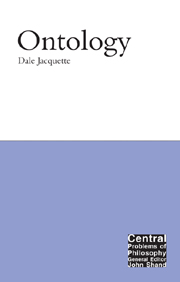Book contents
- Frontmatter
- Contents
- Preface
- Acknowledgements
- Introduction: Being as such
- I Pure philosophical ontology
- II Applied ontology and the metaphysics of science
- 6 Ontological commitment (on Quine)
- 7 Appearance, reality, substance, transcendence
- 8 Physical entities: space, time, matter and causation, physical states of affairs and events, natural laws
- 9 Abstract entities, particular and universal: numbers, sets, properties, qualities, relations, propositions and possibilities, logical, mathematical and metaphysical laws
- 10 Subjectivity of mind in the world of objective physical facts
- 11 God, a divine supernatural mind?
- 12 Ontology of culture: language, art and artefacts
- Conclusion: scientific–philosophical ontology
- Notes
- Bibliography
- Index
11 - God, a divine supernatural mind?
from II - Applied ontology and the metaphysics of science
- Frontmatter
- Contents
- Preface
- Acknowledgements
- Introduction: Being as such
- I Pure philosophical ontology
- II Applied ontology and the metaphysics of science
- 6 Ontological commitment (on Quine)
- 7 Appearance, reality, substance, transcendence
- 8 Physical entities: space, time, matter and causation, physical states of affairs and events, natural laws
- 9 Abstract entities, particular and universal: numbers, sets, properties, qualities, relations, propositions and possibilities, logical, mathematical and metaphysical laws
- 10 Subjectivity of mind in the world of objective physical facts
- 11 God, a divine supernatural mind?
- 12 Ontology of culture: language, art and artefacts
- Conclusion: scientific–philosophical ontology
- Notes
- Bibliography
- Index
Summary
Concepts of God
An enquiry in applied scientific ontology into the existence or nonexistence of God is not guaranteed to agree with the attitudes of religious faith. We want to know whether God is an individual divine entity, or a host thereof if there are many gods, just as we want to know whether there are numbers, sets or universals. The difference is, among other things, that God is a person, or the gods are supposed to be persons, or at least personifications of natural forces, whereas numbers and everything else in the existence domain other than minds is assumed to be impersonal, non-mental, non-psychological, non-intentional. It is appropriate, therefore, to consider the ontic status of God as a sequel to the ontology of mind.
God is often supposed to be the greatest intelligent entity, an allpowerful creator and wrathful or merciful judge of mankind. The gods in most cultures often seem to outsiders to be open to strange briberies. The faithful in their rapture and desperation often believe that they can propitiate God or the gods by religious ceremonies and sacraments in acts of piety, to influence divine intervention in the course of their lives. Not unexpectedly, the vast variety of devout practices involve projections of human values, attitudes and expectations onto the idea of a divine entity or entities, by which customary modes of tribute to reigning secular authorities in a local power structure, showing honour to family and community members and rulers, are deemed appropriate also for the worship of a divine entity or entities.
- Type
- Chapter
- Information
- Ontology , pp. 253 - 264Publisher: Acumen PublishingPrint publication year: 2002

